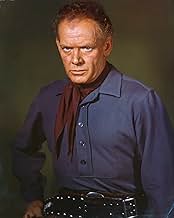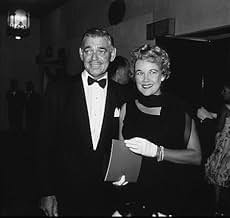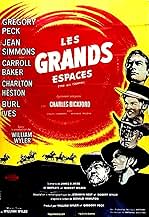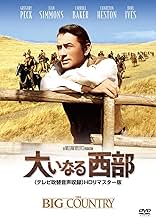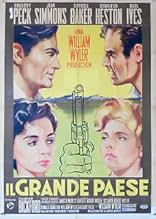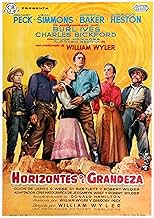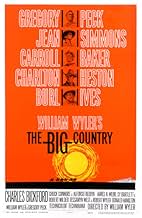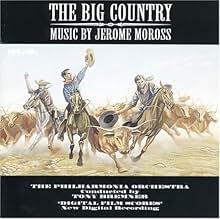IMDb-BEWERTUNG
7,9/10
23.004
IHRE BEWERTUNG
Ein Neu-Engländer kommt im Wilden Westen an, wo er in eine Fehde zwischen zwei Familien über ein wertvolles Stück Land verwickelt wird.Ein Neu-Engländer kommt im Wilden Westen an, wo er in eine Fehde zwischen zwei Familien über ein wertvolles Stück Land verwickelt wird.Ein Neu-Engländer kommt im Wilden Westen an, wo er in eine Fehde zwischen zwei Familien über ein wertvolles Stück Land verwickelt wird.
- 1 Oscar gewonnen
- 3 Gewinne & 5 Nominierungen insgesamt
Slim Talbot
- Terrill Cowboy
- (as Jay Slim Talbot)
Richard Alexander
- Party Guest
- (Nicht genannt)
Rudy Bowman
- Party Guest
- (Nicht genannt)
Empfohlene Bewertungen
Alec West said spoke well in his post about the movie. It is one of my favorite movies for similar reasons. I would only add that I have used the film to illustrate different male and female values and styles. In Jim and Leech, and Buck as well, we see quite different versions of maleness: their world-views and how they present themselves to others. The contrast between Terrill and Hannassay is another interesting study. Pat and Julie offer a couple wonderful contrasts of female ways of being in the world. As a therapist, I have seen present day versions of these characters' values and behaviors time and again. My favorite character is Jim, but the character of greatest interest to me is Steve Leech. I admire his loyalty and find his transformation through his interactions with McKay well drawn.
As several characters state in the film, "This is a big country" and THIS is a BIG MOVIE. It screams out for widescreen viewing. Many of the characters are largely and broadly drawn with big strokes (stubborn Peck, fiery Baker, resentful Heston, righteous Simmons, imperious Bickford, cantankerous Ives and slithering Connors) yet they all are dwarfed by the huge landscape. Tall men, horses, trees and houses are all presented as so many ants on an ant hill in many of the images. The film has a compelling story and intriguing interpersonal relationships and rivalries which are all enhanced by this larger than life approach. The landscape is sometimes awe-inspiring, notably in the Blanco Canyon scenes near the end of the film. Peck is appropriately straight-laced and uncomfortable in this rough & tumble setting, lovely Simmons is a likable heroine and Baker is an effective daddy's girl with misplaced affections. Connors acquits himself very nicely as a thoroughly detestable punk. Heston comes off extremely strong in this film. He's completely at home and was probably never more handsome (check out the scene in which he's roused from his bed by Peck!) He makes the most out of this secondary role. Bickford and Oscar-winning Ives make a great pair of adversaries...almost makes one wish for a prequel to see what got these two so riled up (but today's filmmakers couldn't be counted upon to do it in a tasteful, classy way.) Memorable scenes include the taunting of Peck by Connors and his brothers, Ives grand entrance into Bickford's house and an almost legendary fight scene between Heston and Peck. All of the above are raised to an even higher plane of excellence by what must be one of the greatest musical scores in film history (western or otherwise.) Jerome Moross composed several themes (the opening title is the best known) which put this film into a whole new category of enjoyment. The score stands alone as a beautiful listening experience and paired with the images in this film, it is amazing. It occasionally seems intrusive, yet knows when to keep quiet as well. The Oscar that year went to Tiompkin's "Old Man and the Sea", but it seems astonishing that anything could have bested this score. The film's only real flaw is slight overlength, but nothing really stands out as aching to be cut! Maybe just bits and pieces....but, really, the story just takes it's time and builds to some stirring moments.
There are many things to enjoy in 'The Big Country'. The landscape itself is a character that seems overwhelming. There are many panoramic shots of it, sweeping out to a misty horizon. All beautifully photographed. This big country seems to glow and the film gets an appropriate music score, sweeping and colourful. It must be one of the most perfect film scores written.
In this breathtaking landscape the story of the characters unfold with their prides, jealousies, fears, loves, pretensions, hopes, disappointments. The actors are first rate and convey lots of feeling not just in dialogue but in looks. It is worth seeing more than once to catch the emotional nuances. This is a film with space in lots of senses and it gives the cast time to flesh out their characters. In all the splendid acting I have a particular admiration for Chuck Connors in a performance of a lifetime. His Buck Hennassey is a coward and a bully yet you can't help feeling sorry for him in the end.
There is also the political undertones, the oft quoted Cold War parallels, embodied in the confrontation between Bickford and Ives of mutually assured destruction, that was an ever present issue in the late fifties. Bickford and Ives have narrow self interested vision that portends destruction, while the Peck character has a wider view of co-operation and fairness. (In an illuminating exchange at the engagement party a guest asks Peck if he has seen anything bigger than the 'big country' and Peck replies to the guest's astonishment that he has, a couple of oceans!) It is the outsider who sees clearest.
William Wyler was a great director and made a great film to be enjoyed on many levels. It is an aural and visual treat but the film also has believable characters performed by a superior cast. And I can't stop humming that theme tune....
In this breathtaking landscape the story of the characters unfold with their prides, jealousies, fears, loves, pretensions, hopes, disappointments. The actors are first rate and convey lots of feeling not just in dialogue but in looks. It is worth seeing more than once to catch the emotional nuances. This is a film with space in lots of senses and it gives the cast time to flesh out their characters. In all the splendid acting I have a particular admiration for Chuck Connors in a performance of a lifetime. His Buck Hennassey is a coward and a bully yet you can't help feeling sorry for him in the end.
There is also the political undertones, the oft quoted Cold War parallels, embodied in the confrontation between Bickford and Ives of mutually assured destruction, that was an ever present issue in the late fifties. Bickford and Ives have narrow self interested vision that portends destruction, while the Peck character has a wider view of co-operation and fairness. (In an illuminating exchange at the engagement party a guest asks Peck if he has seen anything bigger than the 'big country' and Peck replies to the guest's astonishment that he has, a couple of oceans!) It is the outsider who sees clearest.
William Wyler was a great director and made a great film to be enjoyed on many levels. It is an aural and visual treat but the film also has believable characters performed by a superior cast. And I can't stop humming that theme tune....
The Big Country is one big and fun western with concurrent plot lines. The first is the struggle between two implacable enemies, Charles Bickford and Burl Ives. The second is a four sided romantic triangle involving Gregory Peck, Jean Simmons, Charlton Heston, and Carroll Baker with Chuck Connors trying to horn in.
William Wyler directed the almost three hour western with a sure hand and your interest does not wane for one minute in this film. Gregory Peck also was a co-producer on this film as well as the first billed. He had a hand in casting a lot of the film, specifically Burl Ives in his Academy Award winning performance as Rufus Hannessy.
It's the Terrills versus the Hannessys. Charles Bickford is the local Ponderosa owner Major Terrill. Presumably the title comes from the Civil War. Bickford does play Terrill with a military bearing. My guess is that he was a Yankee soldier.
The Hannessys would now be called white trash. They look like hillbilly folk who also came west for fame and fortune. They've also got a big spread in a place called Blanco Canyon. They hate the Yankee Major as much as he hates them.
Sitting between them is Jean Simmons who has inherited a modest piece of land that sits across a river that both outfits water their cattle on as per an agreement with her late grandfather. She doesn't work the land herself any more, she teaches school in town.
Simmons tries to keep above the feud. She is friends with Carroll Baker, Charles Bickford's daughter. She's been east and is bringing home a prospective bridegroom who is a former sea captain played by Gregory Peck. That doesn't sit well with Charlton Heston who is the Terrill foreman. He's got eyes on Baker himself and Chuck Connors who is Burl Ives eldest son has eyes for Simmons when he's not in the local bordello.
A lot of started and broken relationships and a few of the cast members being killed occurs in The Big Country. My favorite scene and line in the film is when Burl Ives gives some advice to Chuck Connors on how to woo and win Jean Simmons. His big advice is to show her how much you care by taking a bath occasionally.
Charlton Heston took a role that was fourth billed because he wanted the opportunity to work with William Wyler. That was one great career move because Wyler and he hit it off so well that Wyler signed him for the lead in his next film which turned out to be Ben-Hur. Heston in his memoirs, conservative as he became, says he also got along very well with Gregory Peck who he called a "thinking man's liberal."
Peck and Wyler had worked together previously on Roman Holiday and had done good work there and also hit it off. However with Peck as a co-producer as well as star they had some clashes on the set. One notable one involved Peck wanting to retake the carriage scene where the Hannessy brothers attack Peck and Baker on the way to the Bickford ranch. Peck wasn't satisfied and wanted a retake. Wyler who was legendary for doing scenes dozens of times until he got what he wanted refused. Later when shown the finished film, Wyler had edited out and around what Peck didn't like and it came out OK. They remained friends, but never worked together again.
Simmons as the independent minded school teacher and Baker as the spoiled daddy's little girl acquit themselves well in their roles. Baker is disappointed in Peck not seeing him as her ideal western man and Simmons upbraids her with the quote I put in the review title.
This is also the final film of Alfonso Bedoya who never did get a role in an American film as good as the one he had as Gold Hat in The Treasure of the Sierra Madre. Still this is a fine farewell performance to a very colorful and talented player.
When he's on the screen Burl Ives dominates and fills it and not just physically either. Rufus Hannessy may not be to the manor born, but he has his own sense of integrity and fair play. All that Burl Ives captured in Rufus and The Big Country is worth watching just for him alone.
And that Jerome Moross score; simply one of the best ever done in the history of film.
William Wyler directed the almost three hour western with a sure hand and your interest does not wane for one minute in this film. Gregory Peck also was a co-producer on this film as well as the first billed. He had a hand in casting a lot of the film, specifically Burl Ives in his Academy Award winning performance as Rufus Hannessy.
It's the Terrills versus the Hannessys. Charles Bickford is the local Ponderosa owner Major Terrill. Presumably the title comes from the Civil War. Bickford does play Terrill with a military bearing. My guess is that he was a Yankee soldier.
The Hannessys would now be called white trash. They look like hillbilly folk who also came west for fame and fortune. They've also got a big spread in a place called Blanco Canyon. They hate the Yankee Major as much as he hates them.
Sitting between them is Jean Simmons who has inherited a modest piece of land that sits across a river that both outfits water their cattle on as per an agreement with her late grandfather. She doesn't work the land herself any more, she teaches school in town.
Simmons tries to keep above the feud. She is friends with Carroll Baker, Charles Bickford's daughter. She's been east and is bringing home a prospective bridegroom who is a former sea captain played by Gregory Peck. That doesn't sit well with Charlton Heston who is the Terrill foreman. He's got eyes on Baker himself and Chuck Connors who is Burl Ives eldest son has eyes for Simmons when he's not in the local bordello.
A lot of started and broken relationships and a few of the cast members being killed occurs in The Big Country. My favorite scene and line in the film is when Burl Ives gives some advice to Chuck Connors on how to woo and win Jean Simmons. His big advice is to show her how much you care by taking a bath occasionally.
Charlton Heston took a role that was fourth billed because he wanted the opportunity to work with William Wyler. That was one great career move because Wyler and he hit it off so well that Wyler signed him for the lead in his next film which turned out to be Ben-Hur. Heston in his memoirs, conservative as he became, says he also got along very well with Gregory Peck who he called a "thinking man's liberal."
Peck and Wyler had worked together previously on Roman Holiday and had done good work there and also hit it off. However with Peck as a co-producer as well as star they had some clashes on the set. One notable one involved Peck wanting to retake the carriage scene where the Hannessy brothers attack Peck and Baker on the way to the Bickford ranch. Peck wasn't satisfied and wanted a retake. Wyler who was legendary for doing scenes dozens of times until he got what he wanted refused. Later when shown the finished film, Wyler had edited out and around what Peck didn't like and it came out OK. They remained friends, but never worked together again.
Simmons as the independent minded school teacher and Baker as the spoiled daddy's little girl acquit themselves well in their roles. Baker is disappointed in Peck not seeing him as her ideal western man and Simmons upbraids her with the quote I put in the review title.
This is also the final film of Alfonso Bedoya who never did get a role in an American film as good as the one he had as Gold Hat in The Treasure of the Sierra Madre. Still this is a fine farewell performance to a very colorful and talented player.
When he's on the screen Burl Ives dominates and fills it and not just physically either. Rufus Hannessy may not be to the manor born, but he has his own sense of integrity and fair play. All that Burl Ives captured in Rufus and The Big Country is worth watching just for him alone.
And that Jerome Moross score; simply one of the best ever done in the history of film.
10alecwest
As a rule, I don't like westerns. This isn't because I'm a city slicker (though now, I do live in a city). I grew up in rural Eastern Oregon where "real" cowboys still herd their cattle through the center of town in John Day, Oregon. My stepfather owned a 10,170 acre cattle ranch. After being raised among "real" cowboys, the Hollywood versions tend to leave me flat. The Big Country was an exception.
Jim McKay (Gregory Peck) introduced us to a different kind of man, far different than most stereotypical men of the Wild West. If I were to compare McKay's character to any other film character, it would be Ghandi. He's a man who doesn't feel obliged to seek the approval of others ... a man who believes that violence doesn't need to be used to solve problems. His secret ride of Old Thunder, making Ramon (Alfonso Bedoya) swear to keep quiet regardless of the outcome, set the tone for McKay's character. His later secret fight with Steve Leech (Charleton Heston), making him swear to keep quiet regardless of the outcome, cemented that tone. This was a REAL man whose opinion of himself was not dependent upon anyone else's opinion ... in stark contrast to anyone else in the film outside of Julie Maragon (Jean Simmons). As Ramon said, "Such a man is very rare."
Outside of McKay, my #2 favorite character in the film was Rufus Hannassey (Burl Ives). I found nothing about him distasteful considering he was a character whose back was against the wall ... whose livelihood was threatened. The things he did make perfect sense in such a situation. His only flaw was his obvious poor parenthood. He really blew it with Buck (Chuck Connors) and Buck's siblings were of the same ilk.
I'm so glad that MGM/UA finally released the widescreen version in 2001. This is a film that deserves such a presence. It may not be playing in theaters anymore but seeing it in any other display size takes so much away from it. I've seen the pan/scan version before and will never go back.
One note. The full listing of writing credits for the film adaptation is lacking. "Ambush In Blanco Canyon," originally serialized in a magazine, was later novelized into "The Big Country" by Donald Hamilton ... and Hamilton also worked on the adaptation as well as Leon Uris ("Topaz," "Exodus," "Gunfight At the OK Corral," etc.).
This epic film was not lacking for anything. It had the best writers, the best actors, the best musical score, and the best scenery of any other film of its time ... western or otherwise. And the film remains one of my favorite films of all time.
Jim McKay (Gregory Peck) introduced us to a different kind of man, far different than most stereotypical men of the Wild West. If I were to compare McKay's character to any other film character, it would be Ghandi. He's a man who doesn't feel obliged to seek the approval of others ... a man who believes that violence doesn't need to be used to solve problems. His secret ride of Old Thunder, making Ramon (Alfonso Bedoya) swear to keep quiet regardless of the outcome, set the tone for McKay's character. His later secret fight with Steve Leech (Charleton Heston), making him swear to keep quiet regardless of the outcome, cemented that tone. This was a REAL man whose opinion of himself was not dependent upon anyone else's opinion ... in stark contrast to anyone else in the film outside of Julie Maragon (Jean Simmons). As Ramon said, "Such a man is very rare."
Outside of McKay, my #2 favorite character in the film was Rufus Hannassey (Burl Ives). I found nothing about him distasteful considering he was a character whose back was against the wall ... whose livelihood was threatened. The things he did make perfect sense in such a situation. His only flaw was his obvious poor parenthood. He really blew it with Buck (Chuck Connors) and Buck's siblings were of the same ilk.
I'm so glad that MGM/UA finally released the widescreen version in 2001. This is a film that deserves such a presence. It may not be playing in theaters anymore but seeing it in any other display size takes so much away from it. I've seen the pan/scan version before and will never go back.
One note. The full listing of writing credits for the film adaptation is lacking. "Ambush In Blanco Canyon," originally serialized in a magazine, was later novelized into "The Big Country" by Donald Hamilton ... and Hamilton also worked on the adaptation as well as Leon Uris ("Topaz," "Exodus," "Gunfight At the OK Corral," etc.).
This epic film was not lacking for anything. It had the best writers, the best actors, the best musical score, and the best scenery of any other film of its time ... western or otherwise. And the film remains one of my favorite films of all time.
Wusstest du schon
- WissenswertesThen US President Dwight D. Eisenhower gave the movie four consecutive showings at the White House and called it "simply the best film ever made. My number one favorite film."
- PatzerAt the beginning of the film Peck's character James McKay is mocked for his wearing of a bowler hat, which the characters make out as something only an easterner would wear. This is in stark contrast with history where the bowler hat was one of the most popular styles in the old west, beating out the Stetson and the sombrero. It has even been referred to as "The Hat that Won the West".
- Zitate
Patricia Terrill: But if he loved me, why would he let me think he was a coward?
Julie Maragon: If you love him, why would you think it? How many times does a man have to win you?
- VerbindungenEdited into Bass on Titles (1982)
Top-Auswahl
Melde dich zum Bewerten an und greife auf die Watchlist für personalisierte Empfehlungen zu.
- How long is The Big Country?Powered by Alexa
Details
- Erscheinungsdatum
- Herkunftsland
- Sprachen
- Auch bekannt als
- Horizontes de grandeza
- Drehorte
- Produktionsfirmen
- Weitere beteiligte Unternehmen bei IMDbPro anzeigen
- Laufzeit2 Stunden 46 Minuten
- Farbe
Zu dieser Seite beitragen
Bearbeitung vorschlagen oder fehlenden Inhalt hinzufügen



